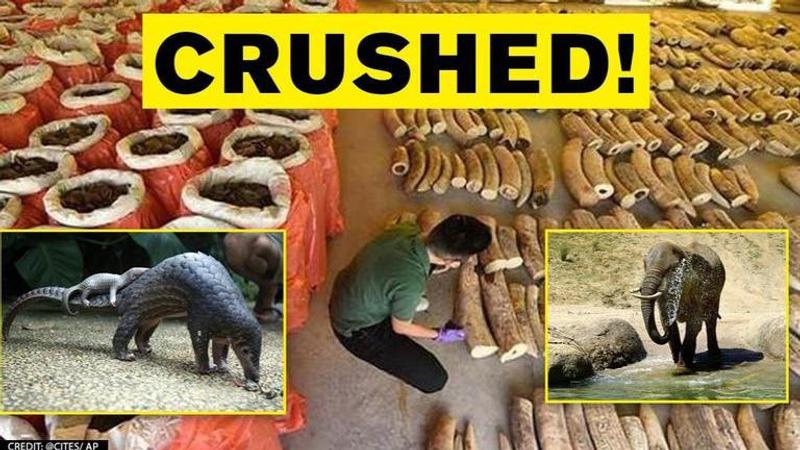Published 09:22 IST, August 12th 2020
Singapore crushes largest illegal ivory cache to commemorate World Elephant Day
Singapore's NParks in a joint operation with ICA & Customs crushed its largest-ever cache of illegal ivory and pangolin scales to commemorate World Elephant Day

In an unprecedented move, Singapore National Parks committee, a statutory body of the government of the tiny island nation, on August 4, crushed 9,000 kgs of ivory seized from illegal and undocumented shipments. According to the CITES (Convention of International Trade in Endangered Species of Wild Fauna and Flora), the consignment's value is worth roughly Rs 97 crores. CITES noted that though, the term "ivory" was traditionally used to describe elephant tusks, in the trafficking world, today it can be a used to describe any tooth and tusk obtained from the giant mammals — anything that has a commercial interest is treated as such.
Joint operation leads to world's biggest ever ivory haul
Singapore's National Parks Board crushed the massive ivory haul to commemorate World Elephant Day, which is August 12. While authorising the order, the committee also launched a new Centre for Wildlife Forensics to "identify and analyse specimens involved in the illegal wildlife trade."
Although this is not the first time Singapore is crushing illegal ivory, on August 4, it seized its largest such cache since the country's known existence. Notably, it is the largest such documented action taken in recent years. The cache included contraband tusks that came from over 300 African elephants. In addition to the ivory, authorities also crushed 37,400 kgs of illegal pangolin scales that were seized between April and July.
The National Parks' Group Director of Wildlife Management Adrian Loo, speaking to The Straits Times, mentioned that the decision to crush the objects was more than just symbolic as they intend to signify Singapore's commitment and determination to fighting illegal wildlife trade. Adrian Loo further added that the assignment was the result of a collaboration between various local agencies such as National Parks, Singapore Customs, ICA (Immigration & Checkpoints Authorities) and other international counterparts, which led to the record amount of seizure over the years.
Adrian Loo justified his point adding that destroying the ivory will prevent it from re-entering the market and disrupting the global supply chain of such illegal contrabands and trafficking. The ivory crushing event which started on August 4 has been conducted in phases and is one of the largest operations conducted and will continue till August 12.
The shipment was discovered by National Parks, Customs and ICA when they inspected a 12-metre contained from Democratic Republic of Congo (RDC) that docked at the harbour and was supposed to reach Vietnam.
Trafficking ivory and pangolin scales
Elephant ivory is coveted for numerous reason and is consumed by different cultures across the world based on their myriad traditions. East Asia, for example, uses it for medicinal purposes (although there is no proven theory explaining its benefits) Western countries traffick the animal parts to fashion items like combs, pendants and other exotic jewellery.
Elephant ivory and trafficking of exotic animals has been outlawed by nearly all countries since 1989. Following the dwindling population of wild animals in Africa, stricter national and international laws were implemented to keep poaching and trafficking in check.
Singapore's unique Centre for Wildlife Forensics
Singapore's National parks opened its first Centre for Wildlife Forensics (CWF) facility, where it lays emphasis on science and technology to investigate cases of illegal wildlife trade. Authorities claimed that the use of forensic science will help identify and verify species based on empirical and verifiable evidence that supports law enforcement and prosecution. The department will also be responsible for identifying wood specimens and DNA testing of animal specimens.
Image and video credits: CITES, Straits Times
Updated 09:40 IST, August 12th 2020




